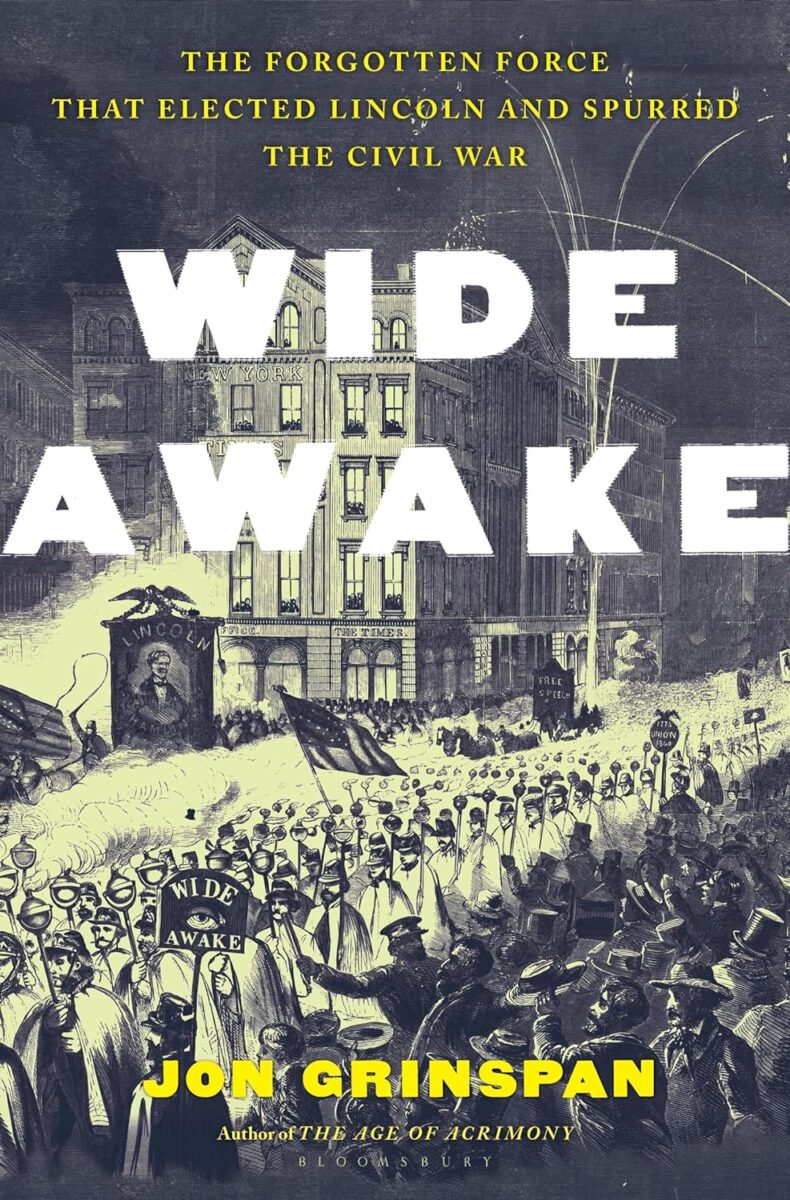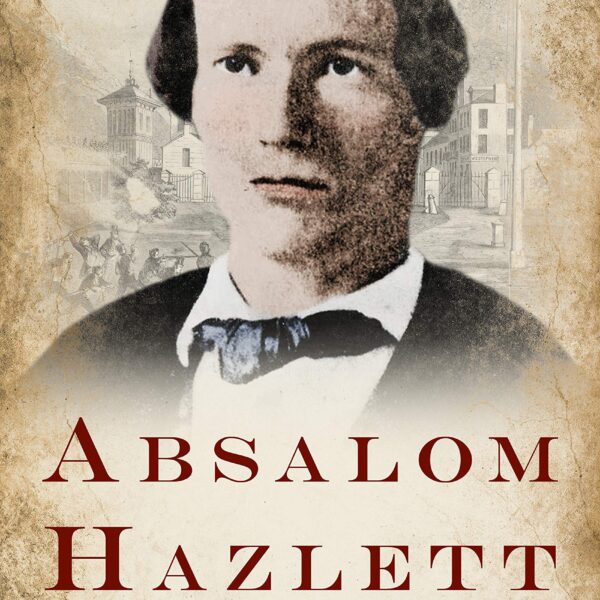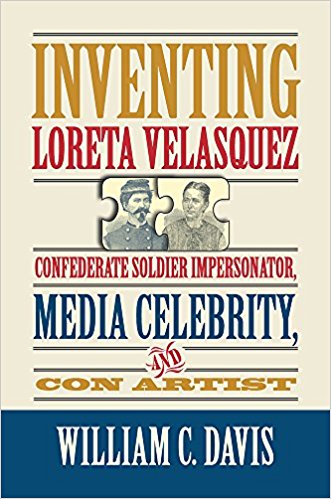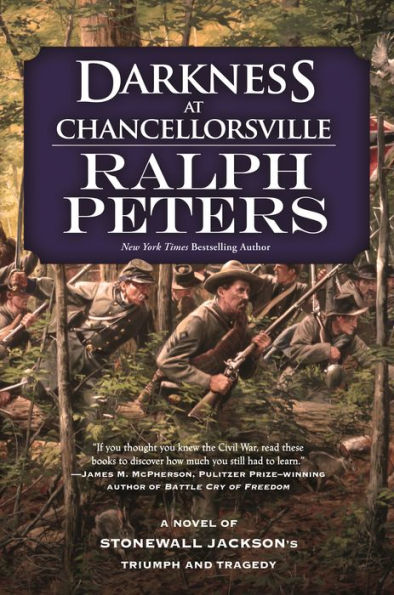What if we were asked to turn our attention away from Charleston Harbor, Harper’s Ferry, Bleeding Kansas, or even the halls of Congress in our search for the political violence and militarism that ignited the Civil War? What if, instead, we were asked to focus on Hartford, Connecticut, and a small group of restless youths who sparked one of the largest political movements of the 1860s? That is precisely what Jon Grinspan, curator of political history at the Smithsonian National Museum of American History, has asked us to do in his new book, Wide Awake: The Forgotten Force that Elected Lincoln and Spurred the Civil War. By showing how the Wide Awake movement grew, organized companies, and animated the election of 1860, Grinspan has given insight into an overlooked grassroots movement of political militarism that helped to elect a Republican president—and struck fear of militarized Republicanism into the minds of Southerners. It is a timely contribution to our understanding of populist politics and the transformation of sectional political rhetoric into open violence.
Grinspan asserts that the highly literate, disgruntled clerks and bookkeepers of Hartford, Connecticut, who started the first Wide Awake company in February1860 initiated a martial political movement that wanted to make order out of the mobbed politics of the 1860s. They also wanted to resist what they saw as a conspiracy by Democrats and Southern slaveholders to limit the free speech of many Americans. By using military marching and drill, as well as uniformed regalia (such as torches and oilcloth capes and hats), Wide Awake clubs were able to appeal to young men throughout the North who longed for an opportunity to find group acceptance, to grasp at upward mobility they saw as stymied by “old fogies,” and to have a voice in a political climate that was dominated by disorder and collapsing political parties (74). Because they were a group more concerned with the process of politics than the outcome, one with “acute imagery and oblique ideals,” the Wide Awakes were able to appeal to hundreds of thousands of men in the North—and draw many women to their movement, as well (32). Wide Awake members ranged from racists dedicated to keeping Black Americans out of western territories to African American abolitionists, like John Mercer Langston and Lewis Hayden, who sought an organized force with which to dismantle the slavocracy. The African American members, though small in number, were the most frightening to Southerners, who feared the overthrow of their society at the hands of phantom, Black Wide Awake armies. As Grinspan asserts, the Wide Awakes were an undercurrent that helped bring voters and supporters toward the Republican Party through their attractive dress and ability to bring order to a chaotic political landscape.
Though they began as a small group of young white men in Connecticut, the Wide Awakes spread an estimated 900 companies across the North and the Upper South; they helped the barely cohesive Republican Party to elect Abraham Lincoln in November of 1860. Importantly, Grinspan shows how Wide Awakes were vague enough in speech to distance themselves from their nativist Know Nothing origins so that they could unite radical German immigrants interested in martial revolution with American-born Yankees of New England. They presented a form of resistance to the conspiracy of Southern slaveholders that had too long demanded concessions from all Americans to appease their claims to slavery. As Grinspan contends, the Wide Awakes were able to help clump their political rivals, the Slave Power, and mobbed politics “into a single threat to democracy itself, demanding a united solution” (37). The Republican Party began to coalesce around the united front of the Wide Awakes that were determined to protect the free speech of the majority.
However, Republican leaders like Abraham Lincoln saw that the Wide Awakes could be both useful and problematic: attractive to some, but martially arrayed against Democrats and Constitutional Unionists. At times, it was the Wide Awakes who seemed to surge and urge politicians forward, not the other way around. One of Grinspan’s greatest interventions is demonstrating that Lincoln and the Wide Awakes gained support independently from one another. While the Wide Awakes were used by Republican leaders to do the dirty work of politics (like canvassing and distributing ballots), many Republican leaders (including Lincoln) tried to keep the marching youths at arm’s length because they saw the danger of associating militarism with Republicanism. Nowhere was this more prominent than in Lincoln’s arrival in Washington in March 1861, as he declined to have a Wide Awake force help defend him from threatened assassination. The Wide Awakes attended Lincoln’s inauguration in their own plain clothes and with their own designs to defend the president. The martial force of the Wide Awakes, though valuable for Republicans, was also frequently a runaway martial machine that Republican leaders knew was less than cautious in its appearances and actions.
In the process of all of their marching, drilling, and hurrahing for Lincoln, the Wide Awakes helped to lay the groundwork for armed warfare. When Southerners saw these marching lines of black-caped Republicans that opposed the Democratic Party and slaveocracy, they feared that their worst nightmare had materialized: that Republicans had begun building an army that could impose their will on Southerners. The specter of a Yankee military force marching in the fall of 1860 caused Southerners to form their own paramilitary political organizations like the National Volunteers, groups which Grinspan calls the “offsets” of the Wide Awakes (131).
The Wide Awakes kept marching after Lincoln’s election. Even though they never planned to be a military force that would overthrow slavery, Grinspan contends that “with so much goading” from opponents, the Wide Awakes transformed from “a political club with militarist symbols into a military organization with political biases” (245). Eventually, the former members of Wide Awake and opposing National Volunteer companies became some of the first to sink into open conflict in the streets of St. Louis and Baltimore in the spring of 1861. Republican leaders like Francis P. Blair, Jr., quickly turned Wide Awake companies into Unionist militias in Missouri. Former supporters of the pro-southern National Volunteers, formed to counter the Wide Awakes, stoned and beat members of the Massachusetts militia as they marched through Baltimore. When the Civil War began in earnest, three quarters of those who had been in Wide Awake companies served in Union forces. As Grinspan shows, however, identity as a Union soldier and veteran quickly replaced their identity as a Wide Awake. This certainly helped to shroud the origins and purposes of the movement. As former Wide Awakes became aged Republicans and Union veterans in the 1880s and 1890s, their malleable sense of political agenda that helped attract so many supporters in 1860 aided many in becoming the elite controllers of capital and politics that they opposed twenty years earlier.
Grinspan is a masterful writer whose prose is absorbing. He tells the important story of the Wide Awakes with style and clarity. Importantly, Grinspan’s decades-long search for the Wide Awakes show in his use of primary sources that he has included. He also makes good use of artifacts and material culture in illustrating his points about the importance of the Wide Awake’s unique uniforms to the material life of the 1860s.
Readers may have questions about whether Grinspan has overstretched his argument, as he sometimes seems to find Wide Awaking in even the most minute instances of militarism and violence. They may also wonder just exactly how much paranoia about the Wide Awakes there was for common Southerners in 1860 and how much it influenced the Southern majority in their reactions. As Grinspan says himself, “many people advocating secession never mentioned the Wide Awakes,” and “probably no one” seceded in 1860 because of the Wide Awakes alone (189, 193). Plenty of acts of martial array and political violence occurred outside of the reach of Wide Awaking, but many Americans “rarely saw” such violent acts, as Grinspan says, although they read and heard about them (11). Finally, was it really the Wide Awakes that started the trend of the “torchlit militarism” that went hand-in-hand with American politics after the war (249)? Or did they merely present one of the most successful organizations that rode an already strong martial culture that endured after the Civil War?
Despite these questions, Grinspan has convincingly demonstrated that the Wide Awakes were a critical force in the coming of the Civil War. He has shown us that the Wide Awakes helped to fuel a nascent Republican Party; created a martial force that sparked fear in reactionary Southerners; and gave purpose, identity, and voice to many young Northerners. He has also demonstrated the consequences of “who hates who” politics in the 1860 election (31, 209). Through Grinspan’s work, misconceptions about the relationships between Republicans, Know Nothings, Wide Awakes, and the coming of the Civilre War have finally been clarified. His important book adds to our understanding of the lived experience of politics for ordinary Americans in the 1860s. Wide Awake is a must-read for 2024.
Andrew Turner is a Ph.D. candidate at the University of North Carolina at Greensboro. His research focuses on youth soldiers, their notions of martial manhood, and their memories of the Civil War.





